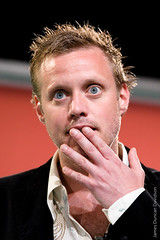
This is ancient news considering how fast news travels across the blogoshpere, but its still one of my favorite examples of the power of Social Media and is worth thinking about.
Ze Frank. (
www.zefrank.com)
It all started in 2001 when Ze invited all of his friends to his birthday party with an online invitation he created called "
How to dance properly". The invitation went viral and quickly generated a large amount of traffic to his site. The site grew to include interactive group projects, short films, animations and video games that featured Ze's unique wit and sense of humor.
On March 17, 2006, Frank took on the ambitious task of posting a video blog every week day for an entire year. The video blog, which quickly became the most popular part of his site, was called "
The Show" and consisted of commentary on world news, personal observation and challenges to viewers.
WARNING. Watching the show is completely adictive. If you watch one, you may just watch them all, so start at the begininng.
Ze named the viewers of the show, Sportracers and often challenged them to various tasks and activities. At one point he challenged all of the Sportracers to a game of chess. Every day Ze would make a move and everyday after a discussion on the forums, the Sportsracers would collectively make a move. After about 30 days, the Sportsracers won.
On one episode of the show, Ze dressed his
vacum cleaner up in clothes and challenged the Sportsracers to do the same. Excited by the cause, Sportracers dressed up their vacum cleaners and uploaded the photos to the
gallery.
The biggest task came when he challenged the Sportsracers to make an
Earth sandwich. Just in case you are wondering how to make an Earth sandwich, this involves taking two peices of bread and placing them simultaneously on oposite sides of the Earth. To aid Sportracers in their task, he created the "If the Earth were a sandwich,
find my oposite tool" to help them find two opposite points on the Earth.
For those Sportsracers that couldn't fly around the world with two pieces of bread, he encouraged them to participate by placing a piece of bread on the ground and then uploading a picture of it to the
photo gallery. And as you can guess, they did.
The craziest part about this is that
two brothers actually did it and made an Earth Sandwich. Thats the power of Social Media. A game of chess, pictures of dressed up vacums, pictures of people placing bread on the ground and flying around the world to make the first Earth sandwich. Its powerful stuff if you can just figure out how to use it.
Photo Credit:
duncandavidson on Flickr






